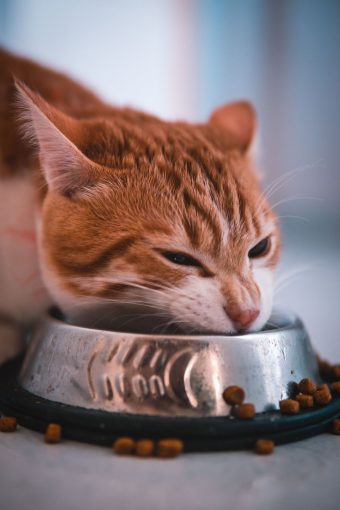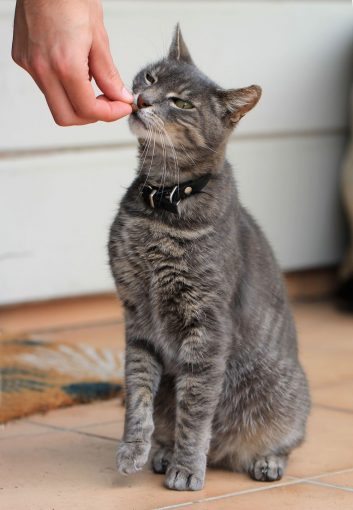Deciding to welcome a cat in your home means taking responsibility for the life of another living being. Before doing that, you have to be sure that you can meet all the needs of your pet. If you want your cat to have a healthy lifestyle, there’s nothing more important than a proper diet.
In Italy, 1 out of 3 cats is obese. If you do not want your cat to become the 1 out of three, it is important for you to be aware of cats’ nutrition needs. In doing so you’ll be able to provide your cat with all the nutrients he needs and you’ll also keep him safe from any digestive system disease.
Although cats are a carnivorous species, their ideal diet has to include a lot of vegetables, so as to provide our four-legged friend with all the nutrients he needs.
What do cats eat? Some myth to debunk

To be sure that your kitty has a proper diet, it is important for you to know what exactly cats eat. Cats are quite demanding pets when it comes to their nutrition: in fact, they need a diet rich in proteins – mainly of animal origin – to be alternated with vegetables.
If you ever found yourself choosing between dry and wet food, you might have realized that it may be quite a dilemma deciding which is the better option. Cats prefer moist, meat-based food, served in small morsels so as not to get its moustaches dirty. However, never forget to check the label! You should always know what your cat is having for a meal as well as look for the best product for him. The ideal combination of ingredients includes the right amount of amino acids, such as taurine and arginine – which are essential for cats. When it comes to dry food, you should also consult your vet first.
If you would rather prepare your cat’s meal at home, here is what cats eat:
- Red or White Meat: although cats prefer raw meat, it is better to serve it cooked so as to avoid the risk of contracting a parasitic desease. White meat, such as chicken, rabbit and turkey along with red meat, such as horse, are the best type of meat for your cat’s diet – it is not necessary to choose prime cuts. Pork and other cured meats are to be avoided;
- Fish: it’s the perfect meal for cats! Once fish is cooked, the thiamine enzyme contained in it is deactivated, which prevents the absorption of iron and destroys vitamin B1. However, a diet based only on canned tuna is not recommended since, being rich in oxidisable fats, it may lead to digestive difficulties and other, more harmful, liver diseases;
- Vegetables: even though they aren’t essential for your cat’s protein intake, serving your cat boiled vegetables – such as zucchini, carrots, green beans and asparagus – helps digestion by providing the right amount of fiber to counteract constipation;
- Starchy food: you can feed your cat rice, bread and pasta as long as they are well cooked, so as to facilitate digestion. However, the gluten contained in these products may cause allergies;
- Oils and fats: carnivorous animals such as cats agree well with high amounts of fat. A tablespoon a day of corn and olive oil will provide your cat with the required amount of fatty acids, which are essential to his diet;
- Water: cats must drink a lot of fresh water, so much so that they need to always have easy access to it, especially at a young age and if they are nursing;
- Milk and cheese: cats tolerate cheese very well. However, care must be taken with milk which, being rich in calcium, phosphorus and protein, may be difficult to digest.
So far we have seen what cats eat, but it’s also important to be aware of the foods to avoid. Besides pork, sweets or, more generally, sugar of any kind, should be avoided since they may put your cat at risk of obesity and diabetes, along with other diseases of the digestive system. Moreover, it is strictly prohibited to feed your cat chocolate: it contains theobromine, a substance that causes intoxication and may also lead to death in cats.
That being said, you must also remember not to feed your cat dog food. It doesn’t contain taurine – which is essential for cats diet – and it can also cause heart problems and blindness.
What do kittens eat?
Kittens, like infants, also need special care and attention. A correct diet during the first year of his life lays the foundation for a strong and healthy growth. Whether he is raised with or without his mother, his diet begins with breastfeeding until solid foods are gradually added to his meals.
The stages of kittens’ diet are thus divided:
- Breastfeeding: during the first 3-4 weeks of life, kittens need the nutritional elements of their mother’s milk or, otherwise, of powdered milk. They need to be fed every 2-3 hours. Right before feeding your kitten, prepare the powdered milk and make sure it’s warm. Don’t ever feed him cow milk since it may cause diarrhea and sometimes fatal dehydration in kittens;
- Weaning: when they are one month old, once the breastfeeding phase is over, what do kittens eat? At this point it’s time to start introducing solid foods to his diet. You can start by alternating milk and solid foods, preferably diluted in lukewarm water to make it easier for the kitten to switch to non-liquid foods. Afterwords, you can gradually increase the amount of solid foods so that by the second month of his life the kitten is completely weaned;
- Post-weaning: in this third phase of feeding, when your two-month-old kitten is weaned, you have to choose between a homemade diet or one based on canned food. If you decide to cook yourself for your kitten, start by blending boiled chicken with boiled carrot. It’s a perfect meal for your cat, since it is easy to digest. In the second case, you can just buy canned food for kittens.
A good practice for your kitten’s diet is to get him used to having 5 meals a day: by doing so you’ll avoid wasting food – cats also prefer to eat little but often. Moreover, it is very important for your kitten to have a always full and easily accessible water bowl. Don’t panic if your kitten drinks less than usual! Cats are animals that know how to make good use of the water contained in food – especially wet food.
Moreover, it is essential to avoid, in addition to cow’s milk, food intended for adult cats since it doesn’t provide the nutritional elements necessary for the development of kittens. You should not also feed your pet powdered milk after weaning: it is not essential for the growth of kittens and may result in being a nutritional excess. Finally, kittens, as adult cats, shouldn’t eat chocolate or any kind of sweets.
How much should a cat eat?
Since more and more cats are overweight, many owners are wondering how much cats should eat. There is no clear answer to this question: each cat is different from the other and so are his habits and his diet.

In addition to weight, here are the factors to consider when calculating how much an adult cat should eat:
- Lifestyle: if your cat has a sedentary lifestyle, the amount of fat he burns is smaller and, therefore, he needs less food. On the other hand, if your cat spends a lot of time outdoors, he needs more food to compensate for the large amount of calories he burns everyday;
- Age: a kitten definitely consumes a smaller amount of food if compared to the amount of an adult cat. However, one should consider that their diet varies more in nutrients, since kittens need more of them for a healthy development;
- Health: if your cat has health problems or he is recovering from surgery, your vet will be able to recommend the most suitable diet for your 4-legged friend.
Generally speaking, you have to get your cat used to having at least three meals a day from the very first months of his life. Start with small amounts of food and gradually increase it day by day. Actually, cats can hardly empty a full bowl of food! Overeating will only lead our 4-legged friend to higher risk of developing serious diseases such as diabetes and obesity. By their very nature, cats prefers reduced but frequent meals.
If your cat’s meals consist of dry food (such as kibble), you may always leave it at his disposal. However, you should avoid doing the same with wet food.
If you are wondering how much food you should give your cat, consider that an adult cat, depending on his weight, should eat this amount of food:
- Dry food: the right quantity of dry food for an adult cat is equal to 40 g for each kilogram of his body weight divided by three. Dry food, being more concentrated if compared to the wet one, is to be consumed in smaller quantities. However, the nutritional and energetic intake is the same;
- Wet food: the quantity of wet food which satisfies the nutritional needs of an adult cat is equal to 40 g for each kilogram of his body weight.
In conclusion, in order to ensure a healthy lifestyle for your cat, it is important for you to provide him the right amount of food throughout the day. Health, weight and habits affect the amount of food your cat needs. As for humans, snacks between meals may result in extra calories and may be a threat to the balanced diet you planned for him.
